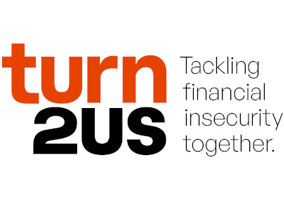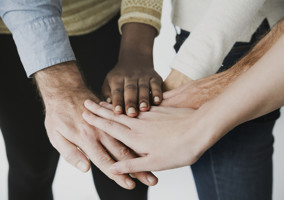A strong theme that emerged from the entries to the Rathbones Covid-19 Response Award at the 2021 Charity Awards was co-production: designing and implementing services in collaboration with people who have lived experience of the cause. It’s a theme that has become more prevalent in Charity Awards applications in recent years, but it was heartening to note how many charities ensured that this crucial part of the process was maintained despite the urgency of their pandemic response.
G&L and our overall Charity Awards partner Rathbone Investment Management were keen to find out more about what co-production really means in terms of services, and also how it pertains to fundraising, so we invited some Awards applicants to join an online discussion.
Turn2Us
One charity that is committed to co-production in both its services and its fundraising is Turn2Us, the charity that tackles financial exclusion. Turn2Us is probably further ahead on its co-production journey than most charities – as it has published a Co-production and Involvement Framework which sets out its approach; defining what co-production means in the organisation, explaining its purpose and outlining the principles which underpin it. Readers can find it at https://bit.ly/Turn2UsCoPro.
Chief executive Thomas Lawson says the starting point is accepting that service users are the experts of their own situation, and genuine co-production requires charity representatives to “sublimate our ego and be in service to the needs of users”.
“Before you take any practical steps to achieve co-production, there has to be complete dedication to be in service. I think there is a problem with charity – it’s paternalistic, it’s benevolent, it’s wise, white and wealthy. We get to feel good about ourselves by supporting someone who needed us. Yet the person who had those needs is the expert of their own situation.”
Lawson says the best example of co-production that he has been involved in was at Terrence Higgins Trust (THT) in the mid-1990s, when the charity was run by mainly gay men who were being personally affected by HIV/Aids. “We were living with, dying from and being bereaved by HIV, so we were designing the best possible services for ourselves. We didn’t call it co-production at the time but looking back, that feels like full co-production to me. I think most charities still have a long way to go until they are where THT was in the 1980s and 90s.”
He says Turn2Us only began doing real co-production a couple of years ago. “It had done bits of consultation before, like many organisations, but not full co-production. We did have a co-production officer in place who was building a co-production strategy across the organisation with our co-production partners – people with lived experience of financial exclusion. So we had left the foothills but by no means had we begun to scale the heights of co-production when Covid hit.”
During the first lockdown in 2020, the numbers of searches on the charity’s online benefits calculator surged from its normal level of around 5,000 a day to 50,000, while calls to the helpline also spiked. The insights that were gleaned from these interactions helped Turn2Us to design and launch a new individual grants programme that had lower thresholds than usual, because the charity knew that people needed the money urgently.
“The amount we gave was £500, cash that went straight into your bank account, and it was a direct response to whether Covid had affected your family’s income and whether you were facing the risk of a financial crisis. Some of those grants we made in three hours, incredibly, although most were made in a matter of days. We gave out about £1.2m.”
To fund this, the charity launched an emergency fundraising appeal through the Daily Telegraph, which raised £1.3m, and leveraged another £1.2m in gifts from companies, major donors and trusts.
Lawson says Turn2Us is very careful about the language it uses in its fundraising, so as not to disenfranchise its service users. He says the Joseph Rowntree Foundation has done some great work recently with the Framework Foundation around how to talk about financial exclusion “with dignity at its heart”, and Turn2Us has adopted that lexicon. “We don’t really use the word ‘poverty’ because in poverty there’s this idea that poor people have created their own dynamic, whereas poverty is actually a system of financial exclusion.
“Also, when we are doing fundraising or journalism with people with lived experience of financial exclusion, we don’t edit people. It’s not our story; it’s their story. We don’t want them to just tell the story that will make it easier for us to raise money.
“What we do say is, be very conscious of the risks of telling your story. Because there is this shame around being poor – ‘you’re indolent and feckless, you can’t manage your budget and it’s your fault’. So you need to think about how will you manage, say, an intrusive question from a donor.”
Oxford Hospitals Charity
Choosing appropriate language is also important to Oxford Hospitals Charity (OHC), which raises funds and delivers services for 13,000 staff and thousands of patients at four hospitals in Oxfordshire. When the pandemic struck, OHC switched overnight into an emergency response organisation.
Hazel Murray, head of programme, recalls: “We reached out right from the start to ask our staff and patients, ‘What do you need? How can we help?’ We didn’t really know at that stage what we were going to do, but we ended up providing support in so many ways.”
Among many other things, the charity provided food, drink and toiletries for hospital staff, tablets and toys for isolated patients, and specialist monitoring equipment for patients who were shielding at home. It set up temporary respite spaces for staff across the four hospitals and provided funding for children’s books to help explain the virus to the children of hospital staff.
OHC was also the first NHS charity to work with the new Salute the NHS organisation which donated more than a million meals to NHS staff. And it coordinated the huge deluge of offers of support from the community. “We basically positioned ourselves as a conduit for solving problems and making things happen quickly,” says Murray.
Communications director Sarah Vaccari says that most of the charity’s staff have lived experience of the hospitals’ services as well as detailed knowledge of the workings of the hospitals, which helped them to respond intuitively. But their efforts were also helped by the early decision that they should join the daily NHS Trust emergency planning and communications meetings. “This meant that we were totally plugged in. We knew exactly which areas were facing the most pressure, and which needed the most help,” she says. Murray adds that the team continually sought staff and patient feedback so that they were always learning and evolving.
The OHC team was determined not to be drawn into using “herofication” in its communications with the public, including in the fundraising for its Covid appeal which raised around £800,000, plus about £1m in gifts in kind. Vaccari explains: “Particularly at the start of the pandemic, there was a lot of talk about NHS heroes and angels, but if you talk to staff in hospitals most of them don’t like that. They are professionals. So we didn’t go down the road of ‘Support our NHS heroes’. It’s easy to go for the quick buck by using language that is maybe a bit tabloid, but we tried hard not to. We told genuine stories, tried to be authentic and share people’s experiences in their own voices.”
Touchstone
The use of language was also raised by Arfan Hanif, CEO at Touchstone, the Yorkshire-wide mental health charity that was recognised in the Charity Awards for its Touchstone Loves Food programme which used food deliveries as a Trojan horse to reach people suffering from mental ill health during lockdowns. He claims, with obvious pride, that Touchstone is “a bit of a leader on co-production”.
“Co-production is embedded into our business,” he says. “We employ a co-production staff team who are part of the Leeds Mental Wellbeing Service, and we have service user consultants who are paid. And our current chief executive, ie me, is born of lived experience – I am a survivor of the mental health system and am currently a mental health service user. We have many staff who have that lived experience, and that’s where our strength comes from as an organisation.”
Hanif insists that employee representation is key to achieving genuine co-production. “We employ around 250 staff across 30 different mental health services, and around 40% of them come from Black and minority ethnic backgrounds, because it is important that we represent the community that we serve. Around 20% of our staff are also LGBT, including half of our senior management team. We’re very proud of that as an organisation.” Touchstone also works with local prisons to provide employment and volunteering opportunities for ex-prisoners.
Hanif says this representation gives Touchstone credibility to engage with its beneficiary groups and, like Turn2Us, Touchstone has written a Co-production and Involvement Strategy which commits the charity to quality standards across all areas of its work and offers a detailed checklist to help it review and track progress.
However, Hanif professes that he is “not a fan of co-production”, because it is language that comes from the system, not from users.
“When I came to Touchstone many years ago as an employee, in the interview they asked me ‘what’s your understanding of co-production?’ and I didn’t really know. Language like co-production and equalities and inclusion is the language of the system, not my language or the language of my communities.”
Lawson agrees, recalling a young woman who asked him earlier in his career what the phrase “hard to reach” meant, as she had heard herself labelled as such by a youth charity. He says he tried to explain it to her, to which she retorted sharply, “I’m not hard to reach. I’m here, and I’ve always been here!”.
He says: “That made me realise that in using that language, the charity was defining her as the problem by declaring it was her who was hard to reach, instead of the charity not being good enough at being embedded in the community and led by the community.”
Hanif adds: “For me, what we do is not about charity, it’s about solidarity. It’s about enabling people to make the change and the difference, not doing it for them. We’re there to serve.”
All We Can
International NGO All We Can, formerly the Methodist Relief and Development Fund, made a deliberate decision about six years ago to become more of an enabler to its partner organisations. For more than 80 years, All We Can has raised money from churches and individuals and spent it through partners on the ground in six countries: Cameroon, India, Ethiopia, Uganda, Zimbabwe and Malawi. But in 2013-14, according to programmes director Angela Zamaere Smith, the charity “went on a journey of introspection” where it examined the impact of its work and invited comments from partner organisations.
“From this we realised that while we’d done a lot of good in the world, the way we were providing support was really quite restrictive. Our partners told us that we would go into communities with our own agenda, wanting to support, say, agriculture or health programmes or water, and that this restricted how they were able to respond.
“We made a decision then that we would become more of an enabler – a catalyst for development, a critical friend of our partners, and we would provide capacity development support, as well as grant funding. In that way, we would put our local partners and their communities at the heart of their own transformation and make them drivers of their own development agendas. Our partners go out into communities, identify the issues they are facing, co-design solutions, and then request the support they need from us based on their strategies and annual plans. So from about 2015, our funding has been unrestricted, but the partners restrict themselves based on the annual plans they submit to us.”
When Covid struck, All We Can had already been working in this way for around six years, which meant it was able to respond flexibly and encourage partners to consider how best they might repurpose their project plans and grant monies. “Obviously they were also assured of full cost recovery to support salaries and PPE (personal protective equipment) to keep staff and communities safe in their interactions. This released partners to focus on finding and implementing solutions, instead of worrying about and pursuing money.”
All We Can has an emergency response group that brings people together from across the organisation in a crisis to examine the programme needs, the state of current finances and whether an appeal should be launched. When Covid hit, the group instigated regular meetings, initially twiceweekly, to scan the ever-changing landscape, review partner requests and consider how to spend any additional monies raised. In the end, the charity launched an appeal in April 2020, which Zamaere Smith admits was a bit later than most charities. But she explains that this was because it wanted to allow its partners to carry out needs assessments “and also to guide our supporters so that they were clear where their money was going”.
“In the past, we’ve gone in very quickly with an appeal, sometimes before we’ve actually gotten a full picture of what’s happening on the ground,” she admits. “In this case, as things were evolving, we didn’t want to do that. We were aware that our supporters were going through a difficult time as well, so we felt we owed it to them to get a fuller picture of how Covid was impacting in other parts of the world. We decided to take two weeks to give our partners the opportunity to go into their communities and find out exactly how Covid was impacting them and their livelihoods. We were then able to launch an appeal that had a lot more clarity, and I think that was appreciated.” The campaign raised just under £500,000 and All We Can also allowed partners to repurpose almost all of their existing annual grants to Covid response.
Giving up power
Zamaere Smith says that in the INGO sector there is much talk now of “shifting power”.
“We have to let go of power, to trust that communities know what they need, that they have the solutions. It can be hard, especially when we have governance that demands and expects certain things in return for the money we give. But we all need to recognise that community members are going through their own journeys; we are outsiders and we will always be outsiders. We will join them for part of the journey but we will leave at some point, and coming in partway through someone’s journey and telling them ‘you need to do this or that’, is just really wrong.”
Lawson contends that many professionals feel anxiety and fear about sharing power; that if they cede power and control to others, they will lose their own agency. “It takes a bit of a mindshift to understand that sharing power makes power grow and reproduce, not diminish,” he says. “But I just don’t think we’ve got the legitimacy to do the work unless we’re doing this. The reason I have an income is because there are people in the UK who don’t have enough money to live on. So I have a profound personal, moral obligation to improve the work we do and the only way to do that is through legitimate shifting, sharing and delegating power.”
Hanif goes even further. “If you’re in power, you should be abdicating your power, because you’ve had it for too long. It’s not a sharing game; if you can share power, then it’s still your power and you are deciding what to do with it. I come from a group that doesn’t have that type of power. Communities have a different definition of power and it’s not the power that the system traditionally has defined for itself.”
Top tips
Lawson’s first piece of advice to charities that want to get better at co-production is to take your time and tread carefully with your co-production partners.
“Take time, create genuinely safe spaces, socially contract with one another, get to know each other. Name and be explicit about the power dynamics that are in the room and talk about what they mean and how they make people feel, to build psychological safety.” He warns against editing people’s stories and emphasises the importance of equipping people to manage the risks they may face in getting involved in this way. Also vital, he says, is paying people for their time and expertise.
Lastly, he advises interrogating hard your own and others’ data so that you can blend this with the rich qualitative research gained from lived expertise and derive actionable insights from these.
Hanif adds that a charity’s co-production strategy must be aligned with its overall objectives, and the organisation must be prepared to invest in the work.
Evaluating impact
So, how can a charity tell if doing co-production is having a real impact on its work? All We Can uses an “outcome harvesting approach”, says Zamaere Smith, “where we look at changes that have happened and then try to look back at attribution. How did that change happen? What do you attribute it to? Out of that we’re learning some really important lessons.”
Hanif concludes that if your organisation is doing co-production properly, its service outcomes can’t fail to improve. But he adds that one of the most important metrics for measuring co-production is employment within the charity.
“There’s no equity without representation. I know our co-production policies work because our employment is representative. We have service users who become peers then become volunteers and then become staff. That’s the co-production path.
“I was a service user at Touchstone nine years ago, sitting in their reception, shaking. Nine years later, I’m their chief executive. That’s co-production in a nutshell.”
With thanks to Rathbones for its support with this feature
Related articles












